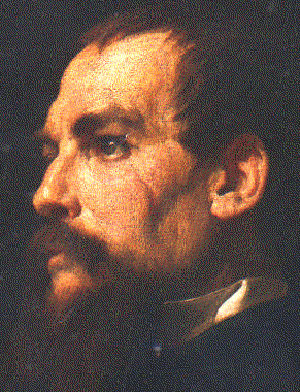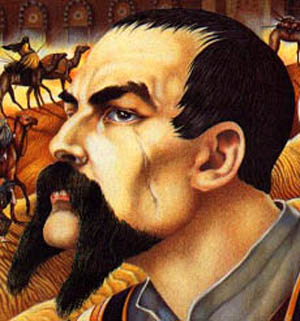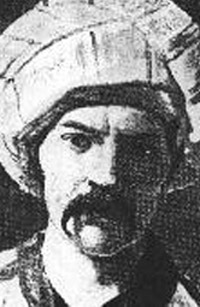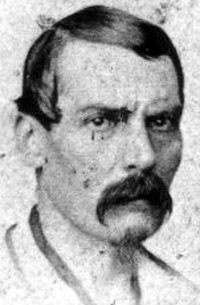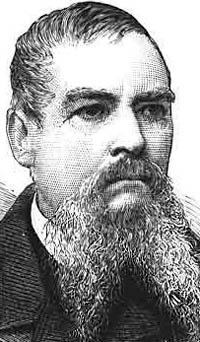Copyright Michael D. Robbins 2005
Astro-Rayological
Interpretation & Charts
Quotes
Biography
Images & Physiognomic Interpretation
All Faith is false, all Faith is true:
Truth is the shattered mirror strown
In myriad bits; while each believes
His little bit the whole to own.Conquer thyself, till thou has done this, thou art but a slave; for it is almost as well to be subjected to another's appetite as to thine own.
(Sun conjunct Pluto in Pisces.)Do what thy manhood bids thee do, from none but self expect applause; He noblest lives and noblest dies who makes and keeps his self-made laws.
(Saturn in Aries opposition Moon.)The more I study religions the more I am convinced that man never worshipped anything but himself.
(Neptune in Capricorn square Sun, Chiron & Jupiter.)The dearest ambition of a slave is not liberty, but to have a slave of his own.
As threshing separates the wheat from the chaff, so does affliction purify virtue."Honour, not honours."
My Dear Gordon,
You and I are too much alike. I could not serve under you, nor you under me. I do not look upon the Soudan as a lasting thing. I have nothing to depend upon but my salary; and I have a wife, and you have not. Indeed he knows not how to know who knows not also how to un-know.When doctors differ who decides amid the milliard-headed throng?One of the gladdest moments of human life, methinks, is the departure upon a distant journey into unknown lands. Shaking off with one mighty effort the fetters of habit, the leaden weight of routine, the cloak of many cares and the slavery of home, man feels once more happy.
(Mercury & Jupiter in Aries.)Now the last hookah has gone out, and the most restless of our servants has turned in. The roof of the cabin is strewed with bodies anything but fragrant, indeed, we cannot help pitying the melancholy fate of poor Morpheus, who is traditionally supposed to encircle such sleepers with his soft arms. Could you believe it possible that through such a night as this they choose to sleep under those wadded cotton coverlets, and dread not instantaneous asphixiation?
Is not man born with a love of change — an Englishman to be discontented — an Anglo-Indian to grumble?
Travellers like poets are mostly an angry race.
Presently our fire being exhausted, and the enemy pressing on with spear and javelin, the position became untenable; the tent was nearly battered down by clubs, and had we been entangled in its folds, we should have been killed without the power of resistance. I gave the word for a rush, and sallied out with my sabre, closely followed by Lieut. Herne, with Lieut. Speke in the rear. The former was allowed to pass through the enemy with no severer injury than a few hard blows with a war club. The latter was thrown down by a stone hurled at his chest and taken prisoner, a circumstance which we did not learn till afterwards. On leaving the tent I thought that I perceived the figure of the late Lieut. Stroyan lying upon the ground close to the camels. I was surrounded at the time by about a dozen of the enemy, whose clubs rattled upon me without mercy, and the strokes of my sabre were rendered uncertain by the energetic pushes of an attendant who thus hoped to save me. The blade was raised to cut him down: he cried out in dismay, and at that moment a Somali stepped forward, threw his spear so as to pierce my face, and retired before he could be punished. I then fell back for assistance, and the enemy feared pursuing us into the darkness. Many of our Somalis and servants were lurking about 100 yards from the fray, but nothing would persuade them to advance. The loss of blood causing me to feel faint, I was obliged to lie down, and, as dawn approached, the craft from Aynterad was seen apparently making sail out of the harbour.
" Narrative of a Trip to Harar" presented, 11 June 1855, published in The Journal of the Royal Geographical Society (June 1855); a brief account of the attack that left him scarred from a spearhead that entered one side of his face and exited the other.
Support a compatriot against a native, however the former may blunder or plunder.
The recruit must be carefully and sedulously taught when meeting the enemy, even at a trot or canter, to use no force whatever, otherwise his sword will bury itself to the hilt, and the swordsman will either be dragged from his horse, or will be compelled to drop his weapon — if he can. Upon this point I may quote my own System of Bayonet Exercise (p. 27): —
"The instructor must spare no pains in preventing the soldier from using force, especially with the left or guiding arm, as too much exertion generally causes the thrust to miss. A trifling body-stab with the bayonet (I may add with the sword) is sufficient to disable a man; and many a promising young soldier has lost his life by burying his weapon so deep in the enemy's breast that it could not be withdrawn quickly enough to be used against a second assailant. To prevent this happening, the point must be delivered smartly, with but little exertion of force, more like a dart than a thrust, and instantly afterwards the bayonet must be smartly withdrawn." In fact the thrust should consist of two movements executed as nearly simultaneously as possible; and it requires long habit, as the natural man, especially the Englishman, is apt to push home, and to dwell upon his slouching push.
A New System of Sword Exercise for Infantry (1876)
(Mars conjunct North Node. Stellium in Aries.)Attributed:
A man that hoards up riches and enjoys them not, is like an ass that carries gold and eats thistles.
Conquer thyself, till thou has done this, thou art but a slave; for it is almost as well to be subjected to another's appetite as to thine own.
Indeed he knows not how to know who knows not also how to un-know.
Reason is life's sole arbiter.
The dearest ambition of a slave is not liberty, but to have a slave of his own.
The more I study religions the more I am convinced that man never worshipped anything but himself.
All so-called revealed religions consist mainly of three portions, a cosmogony more or less mythical, a history more or less falsified, and a moral code more or less pure.
Support a compatriot against a native, however the former may blunder or plunder.
Who save the madman dares to cry: "'Tis I am right, you all are wrong"?
"You all are right, you all are wrong," we hear the careless Soofi say,
"For each believes his glimm'ering lamp to be the gorgeous light of day."Do what thy manhood bids thee do, from none but self expect applause; He noblest lives and noblest dies who makes and keeps his self-made laws.Sir Richard Francis Burton (19 March 1821 – 20 October 1890) British consul, explorer, translator, writer, poet, Orientalist and swordsman known for his often-unprecedented exploits of travel and exploration as well as his extraordinary knowledge of languages and cultures.
Quotes about Burton
"He was, as has been well said, an Elizabethan born out of time; in the days of Drake his very faults might have counted to his credit." ~ Encyclopædia Britannica, 11th edition.
"The man riveted my attention. He was dark and forceful, and masterful, and ruthless. I have never seen so iron a countenance." ~ Bram Stoker describing his meeting Burton in 1879.
A wider soul than the world was wide
Whose praise made love of him one with pride...
Who rode life's lists as a god might ride.
"Verses on the Death of Richard Burton" by Swinburne"Before middle age, he compressed into his life more of study, more of hardship, and more of successful enterprise and adventurer, than would have sufficed to fill up the existence of half a dozen ordinary men." ~ Lord Derby, 19th century parliamentarian.
Sir Richard Francis Burton (1821 - 1890)
Burton was raised in France and Italy and his talent for languages meant that he was fluent in four languages and two dialects before he was twenty: he would eventually learn 25 languages and another 15 dialects.Expelled from Oxford in 1842, he became an officer in the Bombay Native Infantry. Working in intelligence, he was asked to investigate homosexual brothels in Karachi; his explicit study resulted in their closure and also killed his army career. Now intent on exploration, in 1855 Burton planned an expedition with three others, including John Speke, to discover the source of the Nile. They intended to push across Somaliland, but were attacked and were forced to return to England.
The two returned to Africa in 1857-58, travelling inland from Zanzibar. It was a difficult trip; when they arrived at Lake Tanganyika, Speke was almost blind and Burton could hardly walk. Speke pushed on alone and discovered Lake Victoria, which he was convinced was the true source of the Nile. Burton disagreed with him, the two became badly estranged and, in September 1864, a debate between the two ended in tragedy when Speke was killed while hunting.
Burton's next move was to the Foreign Office, which appointed him consul in Fernando Po, a Spanish island off the coast of West Africa. During his three years there, he gathered enough material for five books that described tribal rituals - including ritual murder, cannibalism and sexual practices - in explicit detail.
He spent four unhappy years in Brazil before being appointed consul in Damascus. His initial success was undermined by Muslim intrigue and his Catholic wife's evangelising and he was dismissed in 1871. The next year he moved to Trieste, a place he eventually came to regard as home. He continued writing, covering subjects from Iceland to Ghana and translating Classical and Renaissance literature. What excited him most, however, was Eastern erotica. He translated and printed the Kama Sutra (1883) and The Perfumed Garden (1886) and published a complete edition of the Arabian Nights (1885 - 88), which still stands unchallenged. Knighted in 1886, Burton died in Trieste four years later.
Brief Biography of Sir Richard Burton
Early Years
Richard Francis Burton was born near Elstree, Hertfordshire, on March 19, 1821, the son of an army colonel. As a boy he accompanied his parents on their frequent travels about the European continent. Burton and his brother were first wild children -- at ten years of age, Burton stole his father's rifle and shot out stained-glass church windows -- and, later, wilder adolescents. They frequented the taverns, gambling dens, fencing salles, and gypsy camps and brothels of France and Italy; they terrorized their tutors. Burton later attended Oxford University, where he was known as "Ruffian Dick" for his long moustaches and penchant for challenging students to duels; he was eventually expelled for attending horse races. He was overjoyed at leaving Oxford; he found the dons and fellow students notably dull, and exited with a flair: he drove his horses and carriage over the flower beds while blowing a trumpet.
At 21 Burton joined the army of the East India Company and was posted to the Sindh, where he lived with the Muslims and learned several Eastern languages and dialects, including Iranian, Hindustani, and Arabic. (He mastered Arabic and Hindi and, during his eight-year stay, became proficient also in Marathi, Sindhi, Punjabi, Telugu, Pashto, and Multani. In his travels in Asia, Africa, and South America, he learned 25 languages, with dialects that brought the number to 40.
As an intelligence officer assigned to go undercover in the souks and bazaars of the Sindh, Burton [image] perfected his language ability and disguises and brought information back to his commanding officer, the renowned Sir Charles Napier. One assignment required him to investigate male brothels, where he reported that many of the customers were British officers. His report was hushed up and he came under close scrutiny after Napier was dispatched from India. Ill with cholera and under the cloud of his report, he returned home, at the age of 29.
Middle Years
After those seven years in India he returned to recuperate with his mother and sister in France, where he wrote four books on India in the next three years and planned his next adventure: entering Mecca disguised as a Muslim hajj. This feat, which if he were discovered would have resulted in his summary execution by beheading or crucifixion, was not the first time that a non-Muslim had breached the holy city. But Burton wrote about his trip, where he posed as an Afghani physician [image], (Pilgrimage to El Medinah and Mecca, 1855-56) as more than a travel narrative or tale of adventure.
His work captured the customs and morals of the Muslim peoples he encountered, in a manner that modern anthropologists call "ethnology". When the Muslims eventually found that he had secretly sketched the ka'aba while others prayed and lived to write about it dispassionately, and that Burton had expressed often his admiration for Muslim customs and beliefs, and that he spoke Arabic so fluently, they ignored the insult saying that he really was an Arab.
Before returning in triumph to England, Burton set out to to enter the forbidden Muslim city of Harar, ostensibly to establish horse trading routes. All non-believers who had entered this Somalian city before Burton had been executed, and in this Burton became the first white man to enter and leave alive. He wrote about this as First Footsteps in East Africa.
On leave again in 1854, Burton went again to Somaliland in eastern Africa with John Speke to find the source of the Nile. Their party was attacked by Somali tribesmen; Speke was seriously injured and Burton's jaw was pierced by a spear. He returned to England to recuperate, when the Crimean War broke out. After his recovery, in July 1855, he went to the Crimea to volunteer in the war against Russia. Burton trained Turkish irregulars at the front in the Dardanelles, but saw no action himself.
The war over, on a second expedition in Africa with Speke (1857-58), Burton discovered Lake Tanganyika in 1858. Speke -- correctly-- believed Victoria to be the source of the Nile. He returned to England to become famous as the discoverer of the Nile, but the dispute over the source led to a bitter feud between them that ended only when Speke accidentally shot himself on a hunting trip.
In 1860 Burton made an overland trip to Utah to visit the Mormons and their leader. This meeting with Brigham Young and extensive reporting on polygamy was reported in The City of the Saints (1861). Shortly after his return from the United States, in January 1861, he secretly married the aristocrat Isabel Arundell [image], the daughter of an aristocratic (and Catholic) family.
Burton joined the British Foreign Office as a consul to Fernando Po, a Spnaish island off the coast of West Africa. From there he travelled to the African continent often, resulting in five books that were popular for his description of tribal rituals, cannibalism, and what were to the British reading public, bizarre sexual customs. His preoccupation with all facets of African cultures led the British home office to be wary of him.
He was posted next as consul to Santos, Brazil. As usual, he wrote books about the area (The Highlands of Brazil) and began his extensive translation of Camoens, the Portuguese poet, and of Hindu folk-tales. But Burton loathed Brazil and began drinking heavily, whereupon his wife petitioned the home office to transfer him to the Middle East, to Damascus.
In Damascus Burton was successful and happy for a time, but as usual, discontent set in, which Burton always found difficult to suppress. His wife [image] created additional troubles by her religious proselytizing that, coupled with Arab intrigue, led to his dismissal.
Last Years
In 1872 Burton [image] was assigned to Trieste as consul. He wrote extensively there: travel (Iceland, India, and Africa), archaeology (Italy), his own poetry (The Kasidah), and translations of Italian, Roman, Persian poetry, and six volumes of Camoens. He brought the erotica of the East in an unexpurgated form (The Perfumed Garden,The Ananga Ranga, and The Kama Sutra of Vatsayana) to the staid Victorian world, shocking and outraging them. Burton received some measure of acclaim in his later years. Queen Victoria awarded him the honor of Knight Commander of St. Michael and St. George for his service to England.
Burton died in Trieste on October 20, 1890. Immediately following his death, his wife burned his diaries and current manuscripts, and followed that up with her own whitewashed version of his life, depicting him as a good Catholic, faithful husband, and wronged and misunderstood adventurer. Rebuffed as unfit to be buried in Westminster Abbey with Livingstone, Burton was later buried at Mortlake in London.

